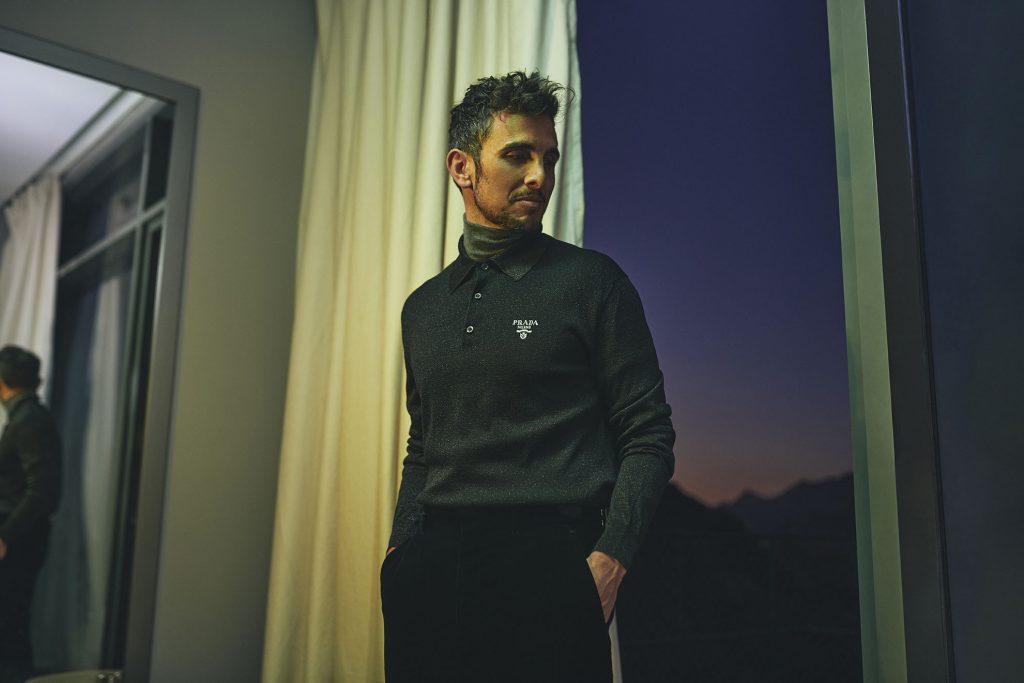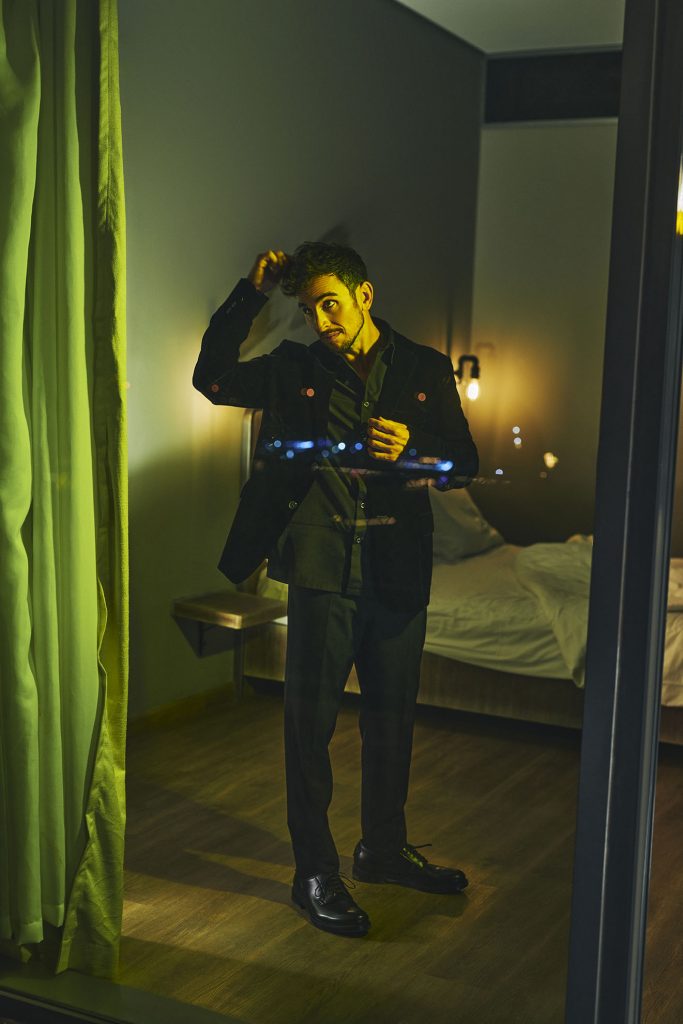It’s a cool Spring evening in 2001, and a fresh-faced 22-year-old Jordanian kid is sitting at a grand piano at a luxurious Ambassador’s residence in a leafy suburb in Washington D.C. He’s half-way through his second number, his eyes closed, swaying rhythmically from side-to-side. You can practically see his every emotion as it mainlines unchecked from his soul through his fingertips to the black and white keys beneath. Every pair of eyes in the 300-person crowd is transfixed on him, including those of Nelson Mandela. All have been invited as part of the United Nations and the Mosaic Foundation, but Zade Dirani—the pianist at the centre of their attention—hardly notices. In a moment that is entirely his, he’s there, but he’s not really there. In an audience filled by some of the most powerful, and influential people on the planet, in that moment, as far as Dirani is concerned, he may as well be playing to himself in his living room.

“I was so young back then that I’m sure that I had butterflies in my stomach before I was about to start,” Dirani recounts to Esquire Middle East, 20 years later. “But once those first few notes come out, you feel like a lion that is let out of a cage. You just want to roam in your natural habitat. You get into a zone that is almost transcendent. Playing is very spiritual experience for me.”
Perhaps more than most of the other art forms, music has the transcendental power to transmit and transport emotions across borders, languages and cultures. Regardless of where you are, music has the ability to free or frighten the soul; to captivate the mind or capitulate a thought; in just a few notes it can conjure a room full of people dancing, or close down a bar.

That understanding of the universality of music has very much shaped Dirani’s (rather busy) life. Born in Amman, he started writing music at age fifteen and very quickly knew that he wanted to play piano for the rest of his life. By nineteen he performed his first concert of his own piano and orchestra songs accompanied by the National Music Conservatory Symphony Orchestra founded by Queen Noor of Jordan. Feted as a piano prodigy, he moved to the United States in 1988 to study at Santa Clara University and later at Berklee College of Music, majoring in music composition and business and management.
“I try to focus on the micro. The act of putting in the work to incrementally get better in every aspect of my life is the source of tremendous joy.”
Fine tuning his talents via a relentless touring schedule of concerts across the US, he would go on to produce Billboard-charting albums, and later performing concerts in front of tens of thousands around the world. His ability to communicate via his music, and adaptation of it as a way to involve a humanitarian aspect to it—initially via the formation of the Zade Foundation for International Peace and Understanding—eventually saw him invited to become a Goodwill Ambassador for UNICEF for the Middle East and North Africa in 2016.

For Dirani the borderless quality of music has not only allowed his art to cross boundaries, cultures and languages, but he uses it as a way to delve deeper into himself to try and understand who he is as a person. “When I play, I am at my most vulnerable,” he says. “I am sincere, fragile and almost naked when playing the piano. If I was a painter or an actor, I would be terrified showcasing that element of my soul, but with music it just flows.”
Just before Dirani jumped on the Zoom interview, he explains that he was running through his scales. Like pretty much any professional musician dedicated to their craft, it is something he does every day; every day working on being that millimeter better than he was the day before.

“Playing music is humbling,” he explains. “No matter how much you learn, there is always someone who knows more than you, therefore it is never about the competition, it is an inward quest to refine who you are as a human being.”
Dirani now lives in Madrid, having moved to Spain in 2015. By his own omission, it is a place that he believes works as a happy medium between the two touchpoints of his cultural upbringing—U.S. and the Middle East. “There is a lot of Spain that feels like the Arab world, but it has that European flair and that global awareness that I appreciate. They know how to enjoy life there. We were filming a music video with [pianist] Richard Clayderman the other day, and during a break the guys from the crew were around the piano playing and singing songs of their own! In Spain life is simple and humble—and I find that speaks to the Arab in me. Essentially, if I was to simplify my identity then I would say that my brain is American, my tastes are European, but my soul is Arab.”
Dirani is talking to us from a room in his sister’s house in Amman. Despite regularly being on the road, he makes a specific point to try and stop in Jordan every time he is in the region to see his family—his niece and nephew, specifically—and he is in the region to shoot for Esquire Middle East.

He is an immediately likeable man, with a wide toothy smile and a positivity that radiates through the camera and practically illuminates the Esquire offices in Dubai. Wearing a much-loved red hoodie and a messy quiff of hair, he flows between easy conversation and deep introspection with the same balance of gravitas and grace so often demonstrated in his music. The secret to that balance is to live in the moment, and give your full attention to ‘the now’.
What is surprising is that during our conversations, there are several times when Dirani brings up businessmen—not musicians—as positive points of reference for his career. He cites Seth Godin a couple of times, and even reveals that his idol is the American billionaire, and Warren Buffet’s business partner, Charlie Munger.
“I’m as interested in the entrepreneurship of music as much as I am with the art of it, which I think is an interesting combination,” he says when we point it out. “I love the idea of constructing a career like you are constructing a music piece. Because I am essentially growing an international brand, I am fascinated with the idea of troubleshooting, networking and growing that business.”

From the stories he tells, it’s clear that there have been some hard lessons and setbacks having grown up in the business. “There are times when you meet your idols and it turns out that they just don’t care—it is heartbreaking when you are so starry-eyed and they reject you,” he says. “But then you meet someone like Richard, and you find someone who can be super successful, and be humble and super chilled about it.”
The ‘Richard’ he is referencing is Richard Clayderman, a world-famous pianist who not only wrote the first musical book that Dirani bought as a 15-year-old, but the two of them have recently collaborated on Princess of the Night—a piano duet composed by French composer and producer Olivier Toussaint—to be released on December 2, 2021, before touring the two-piano performance next year in Bahrain, South America and Spain.
“Before I even knew how to play piano I bought Richard Clayderman’s book. I remember thinking to myself: even if I am living in a tent someday but I can play that type of music at that level, then that is all I want out of life,” says Dirani. “And now that I have a collaboration with him, it is literally a dream come true.”
Throughout the various threads of our conversation—identity, ethics, business interests, humanitarian work—the common ideas of humility and universality continue to come through. But rather than painting it with broad strokes, Dirani demonstrates that he has carefully considered the nuisance that needs to be given to these points.
“If music is a universal language, you still have to select the repertoire accordingly,” he explains. “For example, you cannot expect a very Arabic sounding record to work in middle America. Likewise a bluegrass record in the Arab world—but the essence of it for me is how you shape the sound of the piano when you’re playing it, that is the universal line that cuts through the boundary.”
For Dirani the type of song doesn’t matter when the delivery comes from the soul. That’s what makes it universal, that’s what makes it connect with people—whether it is 1,000 people in an auditorium or you are alone in your living room. Whether Nelson Mandela is in the crowd or not.

Photography by Greg Adamski; Executive Producer Jesse Vora; Styling Seher Khan; Grooming Michel Kiwarkis; Production Manager Ines Guendouz; Styling Assistant Tzoi Manousou; Lighting Assistant Jey Jeyandran; Location Damani Lodges Resort, Hatta
